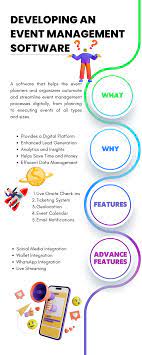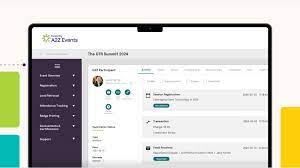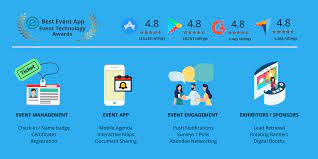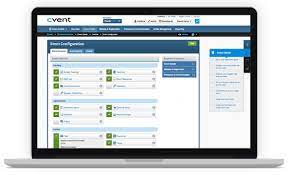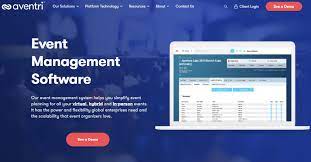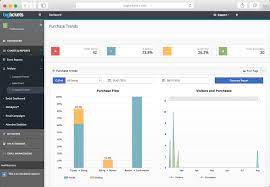Event Planning and Management Software: Streamlining Your Event Success
In today’s fast-paced world, organizing and managing events can be a complex and demanding task. From corporate conferences to weddings, every event requires meticulous planning, coordination, and execution. Fortunately, technology has come to the rescue with event planning and management software, revolutionizing the way events are organized and ensuring their success.
Event planning and management software offers a comprehensive suite of tools designed to streamline the entire event lifecycle. These powerful platforms provide event organizers with the ability to manage multiple aspects of their events efficiently, from initial planning to post-event analysis. Let’s explore some key features that make this software a game-changer for event professionals.
- Centralized Event Management: With event planning software, you can say goodbye to spreadsheets and scattered documents. These platforms provide a centralized hub where you can manage all aspects of your event in one place. From creating detailed agendas and timelines to managing budgets and tracking registrations, everything is easily accessible at your fingertips.
- Online Registration and Ticketing: Gone are the days of manual registration processes. Event management software allows attendees to register online, saving time for both organizers and participants. Integrated ticketing systems enable easy ticket sales, secure payment processing, and instant confirmation emails – making it convenient for attendees while reducing administrative tasks for organizers.
- Efficient Communication: Effective communication is vital for any successful event. Event planning software offers robust communication tools such as email marketing automation, personalized invitations, and real-time notifications to keep everyone informed about updates or changes related to the event schedule or logistics.
- Resource Management: Managing resources like venues, equipment, catering services, and staff can be challenging without proper organization. Event management software provides features like resource scheduling, inventory management systems, vendor databases, and staffing tools that simplify these tasks. This ensures that all resources are allocated appropriately while avoiding conflicts or double bookings.
- Analytics and Reporting: Data-driven decision-making is crucial for event success. Event planning software offers comprehensive analytics and reporting capabilities, providing valuable insights into attendee engagement, ticket sales, marketing campaigns, and more. These insights help organizers identify areas of improvement, measure event ROI, and make informed decisions for future events.
- On-Site Event Support: During the event itself, event management software can enhance the attendee experience and streamline operations. Mobile apps or check-in systems allow for smooth on-site registration and seamless access control. Real-time updates and interactive features keep attendees engaged while enabling organizers to monitor attendance numbers and manage last-minute changes effortlessly.
- Integration with Other Tools: Event management software often integrates with other popular tools like CRM systems, email marketing platforms, survey tools, or project management software. This integration enhances productivity by eliminating data duplication and promoting seamless collaboration across different teams or departments involved in the event planning process.
In conclusion, event planning and management software has revolutionized the way events are organized and executed. From simplifying registration processes to providing real-time analytics, these platforms empower event professionals to save time, reduce manual efforts, enhance attendee experiences, and ultimately achieve successful outcomes.
Whether you’re a professional event planner or organizing an event as part of your job responsibilities, investing in reliable event planning software can be a game-changer for your events. Embrace technology’s potential to streamline your processes and unlock new levels of efficiency in creating memorable experiences for your attendees.
8 Essential Tips for Choosing Event Planning and Management Software
- Assess your needs
- User-friendly interface
- Mobile compatibility
- Integration capabilities
- Customization options
- Robust reporting features
- Support and training resources
- Security measures
Assess your needs
One of the most important tips when considering event planning and management software is to assess your needs thoroughly. Before diving into the vast array of options available, it’s crucial to have a clear understanding of what you require from the software.
Start by identifying the specific goals and objectives you want to achieve with your event. Are you organizing a small corporate meeting or a large-scale conference? Do you need features like online registration, ticketing, or attendee engagement tools? Understanding your event’s scope and requirements will help you narrow down your search for the right software.
Consider the size of your team and their roles in the event planning process. Will multiple team members need access to the software simultaneously? Do you require collaboration features or task management capabilities? Assessing these needs will ensure that the software you choose can accommodate your team’s workflow and enhance productivity.
Budget is another crucial factor to consider. Determine how much you are willing to invest in event planning and management software. Keep in mind that while some software solutions may come with a higher price tag, they often offer more advanced features and robust support. Consider the long-term benefits and potential return on investment when evaluating different pricing options.
Take into account any specific industry requirements or regulations that may impact your choice of software. For instance, if you are organizing an event in a highly regulated industry such as healthcare or finance, ensure that the software complies with relevant data security and privacy standards.
Lastly, don’t forget to consider scalability. While your current event may have specific needs, think about future events as well. Will the software be able to adapt and grow with your organization’s changing needs? Choosing a scalable solution will save you from having to switch platforms down the line.
By assessing your needs thoroughly before selecting an event planning and management software, you can ensure that it aligns perfectly with your goals, budget, team dynamics, industry requirements, and future growth plans. This proactive approach will set the foundation for a successful event planning experience, streamlining your processes and maximizing your event’s potential.
User-friendly interface
User-Friendly Interface: Simplifying Event Planning with Ease
When it comes to event planning and management software, a user-friendly interface is a key feature that cannot be overlooked. A well-designed interface makes all the difference in ensuring a smooth and efficient event planning experience.
A user-friendly interface is intuitive, visually appealing, and easy to navigate. It allows event organizers to quickly grasp the software’s functionalities without the need for extensive training or technical expertise. Let’s explore why a user-friendly interface is crucial for successful event planning.
First and foremost, a user-friendly interface saves time and reduces frustration. Event organizers often have tight deadlines and multiple tasks to juggle. With a software interface that is easy to understand and navigate, they can swiftly access the features they need, eliminating unnecessary clicks or searches. This efficiency allows organizers to focus on other crucial aspects of their event.
Moreover, a user-friendly interface promotes collaboration among team members. When multiple individuals are involved in event planning, it’s essential that everyone can easily understand and use the software. A well-designed interface ensures seamless communication and cooperation by providing clear workflows, collaborative tools, and shared access to information.
Another benefit of a user-friendly interface is its ability to enhance productivity. By simplifying complex processes through intuitive design elements like drag-and-drop functionalities or customizable templates, event planners can accomplish tasks more efficiently. This streamlined approach helps them stay organized while minimizing errors or oversights.
Furthermore, a visually appealing interface creates a positive user experience. Humans are naturally drawn to attractive designs, colors, and layouts. A visually pleasing software interface not only makes event planning more enjoyable but also encourages users to explore its features further. This engagement leads to better utilization of the software’s capabilities and maximizes its value for organizers.
Lastly, a user-friendly interface caters to users of varying technical backgrounds. Not all event planners are tech-savvy experts; some may have limited experience with software applications. A user-friendly interface considers the needs of all users, providing clear instructions, tooltips, and help features to assist those who may require additional guidance. This inclusivity ensures that everyone can confidently navigate the software and make the most of its functionalities.
In conclusion, a user-friendly interface is a vital aspect of event planning and management software. Its intuitive design, time-saving features, collaborative capabilities, enhanced productivity, visual appeal, and inclusivity make it an indispensable tool for event organizers. When selecting event planning software, prioritize a user-friendly interface to simplify your planning process and ensure a seamless experience for you and your team.
Mobile compatibility
Mobile Compatibility: Empowering Event Planning on the Go
In today’s mobile-centric world, having access to information and tools on the go is essential. This holds true for event planning and management as well. One crucial feature to consider when selecting event planning and management software is mobile compatibility. Let’s explore why this feature is a game-changer for event professionals.
With mobile compatibility, event planners can conveniently manage their events anytime, anywhere, using their smartphones or tablets. This flexibility allows organizers to stay connected and productive even when they are away from their desks or on-site at the event venue.
One of the significant advantages of mobile compatibility is the ability to access real-time data and make quick decisions on the spot. Whether it’s checking attendee registrations, reviewing schedules, or making last-minute changes, event planners can have all the necessary information at their fingertips. This ensures that they can respond promptly to any situation that arises during the planning process or on-site during the event itself.
Mobile-compatible event planning software also enables seamless collaboration among team members. With instant access to shared documents, task lists, and communication channels, team members can stay in sync no matter where they are located. This feature promotes efficient teamwork and eliminates delays caused by waiting for someone to return to their desk.
Another advantage of mobile compatibility is its impact on attendee engagement. Many event management software platforms offer dedicated mobile apps that attendees can download onto their smartphones or tablets. These apps provide a personalized experience for attendees by offering features like interactive agendas, session reminders, networking opportunities, surveys, and live polling. By leveraging these tools through mobile devices, organizers can enhance attendee engagement and create memorable experiences.
Furthermore, having mobile compatibility ensures that event planners are always prepared for unexpected situations. Whether it’s a sudden change in schedule or an urgent need for information during an off-site meeting with stakeholders, being able to access critical details through a mobile device guarantees that nothing falls through the cracks.
In conclusion, mobile compatibility is a key feature that empowers event planners to stay connected, productive, and responsive in today’s fast-paced world. By having access to event planning and management software on their mobile devices, organizers can efficiently manage their events on the go, collaborate effectively with team members, engage attendees through dedicated mobile apps, and handle unexpected situations with ease.
When selecting event planning and management software, be sure to prioritize mobile compatibility to unlock the full potential of your event planning capabilities. Embrace the freedom and flexibility that mobile technology offers and elevate your event planning experience to new heights.
Integration capabilities
Integration Capabilities: Unlocking the Full Potential of Event Planning and Management Software
When it comes to event planning and management software, one feature that can truly elevate your experience is integration capabilities. The ability of software to seamlessly connect with other tools and platforms can unlock a world of possibilities and streamline your event planning process like never before.
Integration capabilities allow event planning software to communicate and share data with other popular tools used in the industry. This means that you can connect your event management software with customer relationship management (CRM) systems, email marketing platforms, survey tools, project management software, and more.
Why is this important? Well, imagine being able to sync attendee data from your event registration platform directly into your CRM system. This not only saves time but also ensures that you have a centralized database of all your attendees, allowing you to personalize communication and track their engagement effortlessly.
Furthermore, integrating with email marketing platforms enables you to automate personalized email campaigns based on attendee behavior or preferences. You can send targeted invitations, reminders, or post-event surveys without manually exporting or importing data between systems.
Project management integration is another game-changer. By connecting your event planning software with project management tools, you can seamlessly assign tasks to team members, set deadlines, track progress, and collaborate effectively in real-time. This promotes efficient teamwork while keeping everyone on the same page throughout the event planning process.
Integration capabilities also extend to financial systems. By integrating with accounting or payment processing platforms, you can automate billing processes for sponsors or exhibitors, generate invoices directly from registration data, and ensure accurate financial tracking for your events.
The possibilities are endless when it comes to integration capabilities in event planning and management software. It eliminates the need for manual data entry or duplicate efforts across multiple systems while ensuring accuracy and consistency throughout your event workflow.
When considering an event planning software solution for your next event, make sure to explore its integration capabilities. Look for software that offers seamless integration with the tools you already use or plan to use in your event planning process. This will not only save you time and effort but also enhance your overall productivity and effectiveness.
In conclusion, integration capabilities are a key factor to consider when choosing event planning and management software. By connecting your software with other tools, you can streamline processes, improve data accuracy, enhance communication, and ultimately unlock the full potential of your event planning efforts. Embrace the power of integration and take your events to new heights of success.
Customization options
Customization Options: Tailoring Your Event Planning and Management Software to Fit Your Needs
When it comes to event planning and management software, one size does not fit all. Every event is unique, with its own set of requirements, branding, and specific goals. That’s where customization options in event planning software come into play, allowing organizers to tailor the software to fit their specific needs.
Customization options provide the flexibility to personalize various aspects of the software according to your event’s branding and requirements. Let’s explore some key benefits of customization in event planning and management software:
- Branding Consistency: Customization options allow you to incorporate your organization’s branding elements into the software interface. From logos and color schemes to fonts and layouts, you can create a cohesive brand experience for both organizers and attendees. This consistency helps reinforce your brand identity throughout the event lifecycle.
- Tailored Workflows: Every event has its own unique workflow and processes. With customization options, you can adapt the software to match your specific workflows seamlessly. Whether it’s creating custom task lists, defining approval processes, or setting up automated notifications, you can align the software with your preferred way of working.
- Data Fields and Forms: Event planning often involves collecting specific information from attendees or vendors. Customization options allow you to create custom data fields or forms within the software to capture the data that matters most to your event. Whether it’s gathering dietary preferences for catering purposes or capturing feedback through post-event surveys, customized forms make data collection efficient and tailored to your needs.
- Reporting and Analytics: While most event planning software offers standard reporting features, customization options take it a step further by allowing you to generate custom reports based on your unique metrics or KPIs (Key Performance Indicators). This empowers you with deeper insights into specific aspects of your event performance that matter most to you or your stakeholders.
- Integration Flexibility: Customization options often extend to integration capabilities, enabling you to connect your event planning software with other tools or systems you use. Whether it’s integrating with your CRM system for seamless attendee data management or syncing with your email marketing platform for targeted communication, customization allows you to create a connected ecosystem that suits your needs.
By leveraging customization options in event planning and management software, you can ensure that the software aligns perfectly with your event’s unique requirements. This not only enhances efficiency and productivity but also helps create a more personalized experience for both organizers and attendees.
When considering event planning software, be sure to explore the customization options available. Look for platforms that provide ample flexibility in branding, workflows, data fields, reporting, and integrations. With the right customization capabilities at your disposal, you can take control of your event planning process and create an unforgettable experience that reflects your organization’s vision and goals.
Robust reporting features
Robust Reporting Features: Unlocking Insights for Event Success
When it comes to event planning and management software, one feature stands out as a game-changer: robust reporting capabilities. These analytical tools offer event organizers valuable insights that can make a significant impact on the success of their events.
Gone are the days of relying solely on gut feelings or guesswork to evaluate event performance. With robust reporting features, event planners can access comprehensive data and metrics that shed light on attendee engagement, ticket sales, marketing campaigns, and more. Let’s explore why these reporting features are so crucial.
First and foremost, robust reporting features enable data-driven decision-making. By analyzing attendee behavior and preferences, organizers can tailor future events to better meet their target audience’s needs. For example, if certain sessions or activities received low attendance rates, organizers can reevaluate their content or scheduling choices for upcoming events.
Moreover, these reporting tools help measure the return on investment (ROI) for an event. By tracking ticket sales, expenses, and revenue generated from sponsorships or partnerships, organizers gain a clear understanding of the financial impact of their events. This information is invaluable when it comes to budgeting for future events or seeking additional funding.
In addition to financial insights, robust reporting features also provide valuable feedback on marketing efforts. Organizers can track the effectiveness of various promotional channels such as social media campaigns or email marketing initiatives. This allows them to identify which strategies yield the highest conversion rates and focus their resources accordingly.
Furthermore, reporting capabilities help identify trends and patterns in attendee behavior. By analyzing data related to session attendance, engagement with exhibitors or sponsors, or survey responses, organizers gain insights into what aspects of their events resonate most with attendees. Armed with this knowledge, they can enhance those elements in future events while addressing any areas that may need improvement.
The ability to generate comprehensive reports also facilitates effective communication with stakeholders. Whether it’s sharing post-event summaries with sponsors, providing attendance metrics to exhibitors, or presenting event analytics to management teams, these reports offer a clear and concise overview of the event’s performance. This not only demonstrates the event’s success but also helps build trust and foster stronger relationships with key stakeholders.
In conclusion, robust reporting features in event planning and management software empower organizers to make data-driven decisions, measure ROI, optimize marketing strategies, identify attendee preferences, and effectively communicate event outcomes. By leveraging these insights, organizers can continuously improve their events and deliver exceptional experiences for attendees.
When considering event planning and management software options, it is crucial to prioritize robust reporting capabilities. The ability to unlock valuable insights from event data will not only enhance the success of current events but also lay the foundation for even more impactful future gatherings.
Support and training resources
Support and Training Resources: Unlocking the Full Potential of Event Planning and Management Software
When it comes to event planning and management software, one key aspect that should not be overlooked is the availability of support and training resources. While these software platforms are designed to simplify the event planning process, understanding their full potential and utilizing them effectively requires proper guidance and knowledge. That’s where support and training resources come into play.
Reputable event planning and management software providers understand that their customers may have varying levels of experience and expertise in using their platforms. To ensure a smooth user experience, they offer comprehensive support resources to assist users at every step of the way.
One valuable resource provided by many software providers is access to a dedicated support team. Whether you have a question about a specific feature, encounter technical issues, or need assistance with troubleshooting, these experts are there to provide prompt solutions. They can offer guidance through phone calls, email exchanges, or even live chat features integrated within the software itself.
In addition to direct support from a knowledgeable team, many software providers also offer extensive documentation such as user guides, FAQs, tutorials, and video demonstrations. These resources serve as self-help tools that allow users to explore different features at their own pace. They provide step-by-step instructions on how to navigate the software’s functionalities effectively.
Another valuable resource for users is training programs or webinars organized by the software provider. These sessions are designed to educate users on various aspects of the platform and its capabilities. Users can learn best practices for event planning, discover advanced features or tips for maximizing efficiency, and gain insights from industry experts who have mastered the software themselves.
By taking advantage of these support and training resources, event planners can unlock the full potential of their chosen event planning and management software. They can become proficient in utilizing all available features, ensuring they make the most out of their investment.
Moreover, these resources empower event planners to stay updated with the latest software updates and advancements. As technology evolves, software providers often introduce new features or improvements to enhance user experience. Regularly engaging with support and training resources ensures that event planners are aware of these updates and can leverage them to their advantage.
In conclusion, support and training resources play a vital role in maximizing the benefits of event planning and management software. They provide users with the necessary guidance, knowledge, and confidence to navigate the software effectively. By utilizing these resources, event planners can streamline their processes, overcome challenges, and deliver exceptional events that leave a lasting impression on attendees.
Security measures
Security Measures: Ensuring the Safety of Your Event with Event Planning and Management Software
When it comes to organizing events, ensuring the safety and security of attendees is of utmost importance. This is where event planning and management software plays a crucial role in implementing robust security measures to protect both participants and event organizers.
Event planning software offers a range of security features that help minimize risks and ensure a safe environment for everyone involved. Let’s explore some key security measures that can be implemented using this software:
- Access Control: With event management software, you can easily set up access control systems to regulate entry to different areas within your event venue. This includes features like barcode scanning, RFID technology, or digital ticketing systems that validate attendee credentials and prevent unauthorized access.
- Emergency Preparedness: In case of emergencies or unforeseen situations, event planning software enables organizers to have emergency response plans in place. This includes features such as emergency contact lists, evacuation maps, and real-time communication tools that allow for quick dissemination of critical information to attendees and staff.
- Data Security: Protecting sensitive attendee data is paramount in today’s digital landscape. Event management software ensures data security through encryption protocols, secure payment gateways, and compliance with privacy regulations like GDPR (General Data Protection Regulation). This helps safeguard personal information collected during the registration process or while interacting with the event platform.
- Incident Tracking: In the unfortunate event of an incident or accident during your event, event planning software can assist in tracking and managing incidents effectively. Incident reporting features allow organizers to document details, assign responsibilities for resolution, track progress, and generate reports for future analysis or legal purposes.
- Risk Assessment: Event management software provides tools for conducting comprehensive risk assessments prior to the event. This involves identifying potential risks or hazards associated with the venue, activities, or external factors such as weather conditions. By evaluating these risks in advance, organizers can implement appropriate mitigation strategies and ensure a safe environment for attendees.
- Communication and Monitoring: Effective communication is vital for maintaining security throughout an event. Event planning software offers real-time communication channels, such as push notifications or SMS alerts, to keep attendees informed about any security updates or emergency situations. Additionally, monitoring features allow organizers to track attendee movements, manage crowd flow, and identify any suspicious activities.
By leveraging the security measures provided by event planning and management software, event organizers can proactively address potential risks and create a secure environment for attendees. Prioritizing safety not only protects participants but also enhances their overall experience, building trust and loyalty for future events.
Remember, safety should always be at the forefront of event planning. Embrace the capabilities of event management software to implement robust security measures that contribute to the success of your event while ensuring the well-being of everyone involved.

